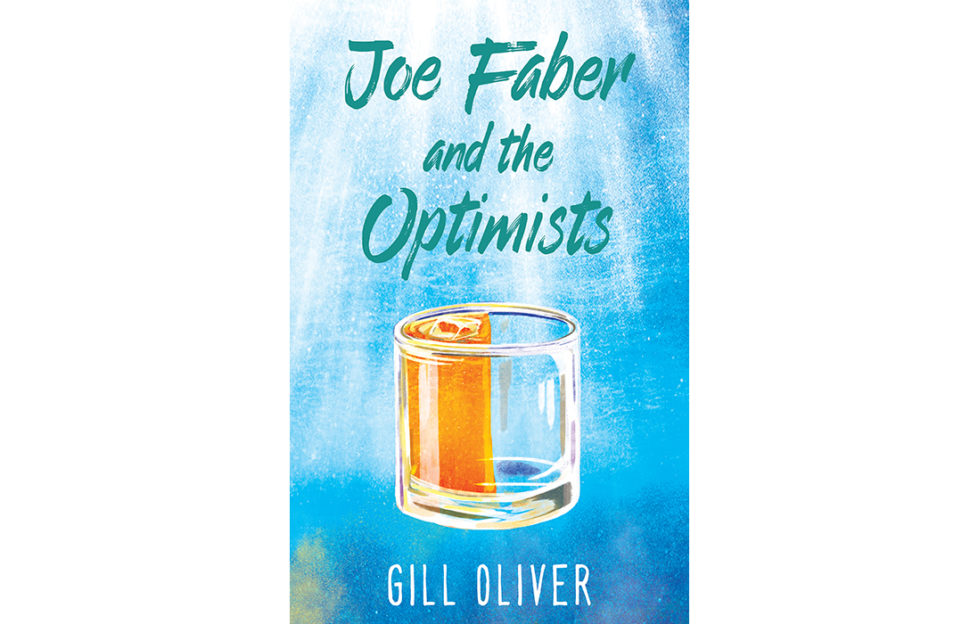Joe Faber and the Optimists | Gill Oliver

Can you write a funny book about a man who’s had a stroke? Gill Oliver, a Somerset-based author has done just that, inspired by her real-life experiences when her husband Terry suffered a stroke in 2013. Here Gill gives an insight into some of the challenges she faced when attempting to turn their story into a work of fiction…
“So,” asked my interviewer, “what are you working on now?” She smiled approvingly when I said I was writing a novel; a funny book about a serious subject. The smile curdled when I told her it was about stroke rehab.
My defence is that when my husband had a life-changing brain haemorrhage, professionals told us that the people who made the best recovery had two things in common: grit, and humour. Knowing that, first-hand, is quite a different thing from selling the idea to strangers, however. It was only in the cocoon of a writing retreat that I read my first sketch – a scene about hoarding urinals and the difficulty of peeing uphill, one-handed. The person who laughed longest and loudest made a pronouncement: this book must someday be published, so that she could read it to her sister, who’d had a stroke. That was all the permission I needed.
Talking about this project, I’ve sometimes met with an awkward coolness, because making comedy out of sickness and disability is in poor taste. The more experience a person has of stroke recovery, however, the more likely they are to break into a broad smile, because they know how bonkers that world is. From the Catch 22 of the Blue Badge (a 6 month wait even to apply for one, so when you most need it, you’re least entitled – and you have to promise not to get better), to the psychological assessment which asks a hemiplegic in a hospital bed whether he still enjoys gardening. You couldn’t make it up.
The stroke has left Terry disabled and robbed him of both his career and his hobbies. But he’s lost neither grit nor humour. And he survived, which outweighs everything. It taught us both to live for the day, and perhaps, paradoxically, that’s the essence of optimism: to deal with what’s in front of you, without fear. In the long process of writing and editing this novel, we’ve both processed our experiences and yes, it’s been cathartic.
Honest, with plenty of laughs, too
In Joe Faber and the Optimists, I shamelessly exploited our first six months of serial incompetence as care giver and care grabber (we were often swapping roles). Now, my husband’s biggest gripe with the finished book is the laughs I missed out. The cognitive test where he had to think of as many words as possible beginning with the letter F (it culminated in a very loud F-F-FORNICATION and giggles all round). A near-disastrous outing to a shopping mall, where borrowed and mechanically unreliable mobility scooter met similarly unreliable hand. Instead of coming to a gentle halt as Terry parked neatly at the edge of the Parisian terrasse of Café Rouge, it edged slowly forward and we watched as one set of table and chairs collapsed neatly onto another, threatening to impale the single diner by the wall.
Joe Faber and the Optimists has a largish cast of invented characters and a made-up story. But the stroke details are pretty faithful to Terry’s experience and will be familiar to many.
Did he really stash urinals so as not to have to call nurses at night? He did.
Did he really take 3 steps from sofa to the mantelpiece before realising he couldn’t get back? He did.
Did he really board the plane to Sumburgh on an evac chair, for lack of an Ambilift at Glasgow? Oh, bumpitty, bumpitty, crunch, crack, yes.
Honestly, if you didn’t laugh, you’d cry.
You can find out more about Gill at www.gilloliverauthor.com.




